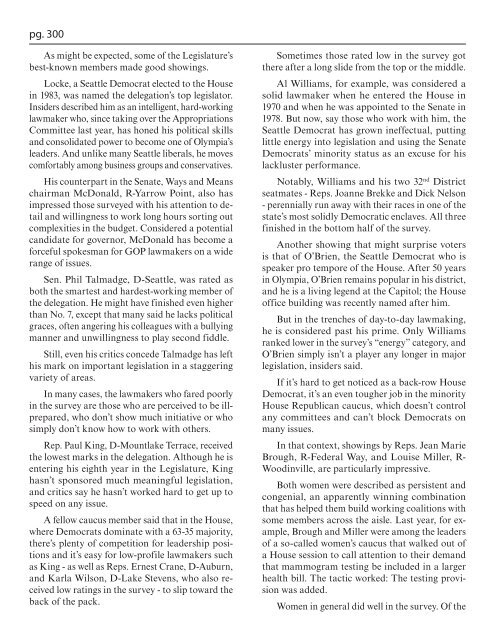Helen Sommers: An Oral History
Helen Sommers: An Oral History
Helen Sommers: An Oral History
Create successful ePaper yourself
Turn your PDF publications into a flip-book with our unique Google optimized e-Paper software.
pg. 300<br />
As might be expected, some of the Legislature’s<br />
best-known members made good showings.<br />
Locke, a Seattle Democrat elected to the House<br />
in 1983, was named the delegation’s top legislator.<br />
Insiders described him as an intelligent, hard-working<br />
lawmaker who, since taking over the Appropriations<br />
Committee last year, has honed his political skills<br />
and consolidated power to become one of Olympia’s<br />
leaders. <strong>An</strong>d unlike many Seattle liberals, he moves<br />
comfortably among business groups and conservatives.<br />
His counterpart in the Senate, Ways and Means<br />
chairman McDonald, R-Yarrow Point, also has<br />
impressed those surveyed with his attention to detail<br />
and willingness to work long hours sorting out<br />
complexities in the budget. Considered a potential<br />
candidate for governor, McDonald has become a<br />
forceful spokesman for GOP lawmakers on a wide<br />
range of issues.<br />
Sen. Phil Talmadge, D-Seattle, was rated as<br />
both the smartest and hardest-working member of<br />
the delegation. He might have finished even higher<br />
than No. 7, except that many said he lacks political<br />
graces, often angering his colleagues with a bullying<br />
manner and unwillingness to play second fiddle.<br />
Still, even his critics concede Talmadge has left<br />
his mark on important legislation in a staggering<br />
variety of areas.<br />
In many cases, the lawmakers who fared poorly<br />
in the survey are those who are perceived to be illprepared,<br />
who don’t show much initiative or who<br />
simply don’t know how to work with others.<br />
Rep. Paul King, D-Mountlake Terrace, received<br />
the lowest marks in the delegation. Although he is<br />
entering his eighth year in the Legislature, King<br />
hasn’t sponsored much meaningful legislation,<br />
and critics say he hasn’t worked hard to get up to<br />
speed on any issue.<br />
A fellow caucus member said that in the House,<br />
where Democrats dominate with a 63-35 majority,<br />
there’s plenty of competition for leadership positions<br />
and it’s easy for low-profile lawmakers such<br />
as King - as well as Reps. Ernest Crane, D-Auburn,<br />
and Karla Wilson, D-Lake Stevens, who also received<br />
low ratings in the survey - to slip toward the<br />
back of the pack.<br />
Sometimes those rated low in the survey got<br />
there after a long slide from the top or the middle.<br />
Al Williams, for example, was considered a<br />
solid lawmaker when he entered the House in<br />
1970 and when he was appointed to the Senate in<br />
1978. But now, say those who work with him, the<br />
Seattle Democrat has grown ineffectual, putting<br />
little energy into legislation and using the Senate<br />
Democrats’ minority status as an excuse for his<br />
lackluster performance.<br />
Notably, Williams and his two 32 nd District<br />
seatmates - Reps. Joanne Brekke and Dick Nelson<br />
- perennially run away with their races in one of the<br />
state’s most solidly Democratic enclaves. All three<br />
finished in the bottom half of the survey.<br />
<strong>An</strong>other showing that might surprise voters<br />
is that of O’Brien, the Seattle Democrat who is<br />
speaker pro tempore of the House. After 50 years<br />
in Olympia, O’Brien remains popular in his district,<br />
and he is a living legend at the Capitol; the House<br />
office building was recently named after him.<br />
But in the trenches of day-to-day lawmaking,<br />
he is considered past his prime. Only Williams<br />
ranked lower in the survey’s “energy’’ category, and<br />
O’Brien simply isn’t a player any longer in major<br />
legislation, insiders said.<br />
If it’s hard to get noticed as a back-row House<br />
Democrat, it’s an even tougher job in the minority<br />
House Republican caucus, which doesn’t control<br />
any committees and can’t block Democrats on<br />
many issues.<br />
In that context, showings by Reps. Jean Marie<br />
Brough, R-Federal Way, and Louise Miller, R-<br />
Woodinville, are particularly impressive.<br />
Both women were described as persistent and<br />
congenial, an apparently winning combination<br />
that has helped them build working coalitions with<br />
some members across the aisle. Last year, for example,<br />
Brough and Miller were among the leaders<br />
of a so-called women’s caucus that walked out of<br />
a House session to call attention to their demand<br />
that mammogram testing be included in a larger<br />
health bill. The tactic worked: The testing provision<br />
was added.<br />
Women in general did well in the survey. Of the
















